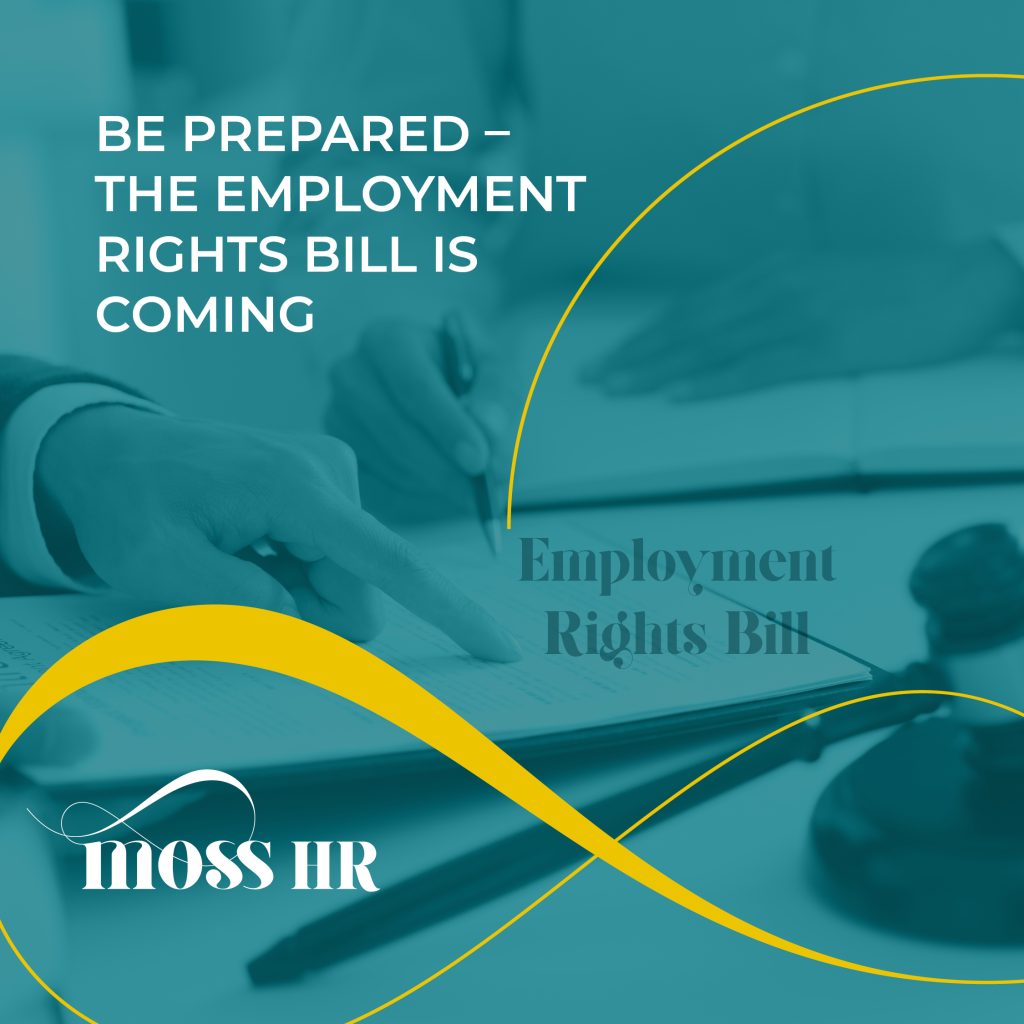When Labour was elected in 2024, one of their first big tasks was to unveil the details of the Employment Rights Bill. This was a key manifesto commitment as part of the Plan to Make Work Pay.
Ever since the details were announced in Parliament last October, we know you’ve had lots of questions and concerns about what this means for you and your organisation.
Considering the Bill comprises a number of areas of reform, such as unfair dismissal, flexible working, zero-hour contracts, and family leave, we’re not surprised you’ve had serious concerns about what impact it will have on you.
Until now, not much had been announced regarding the specifics of the Bill.
But recently, the Government set out their comprehensive roadmap for the Employment Rights Bill. This is good news for you, because it unveils a little more detail in terms of time frames and expectations over the next few years.
As your HR consultants, we’re here to update you and inform you of any legislative changes.
That’s why we’re providing a short breakdown below of what to expect in the foreseeable future. There are still many consultations taking place with business leaders, trade unions and other stakeholders – and as more information comes to light, we’ll inform you all straight away.
The key highlights of the Employment Rights Bill that you need to know
Before we jump right into the details of the implementation roadmap, here’s the key information that you need to know.
What is the current status of the Employment Bill?
The Employment Rights Bill is currently at the Report stage within the House of Lords. This is where the House of Lords has the opportunity to make further amends before it’s granted Royal Assent and placed into law.
When is the Employment Bill likely to receive Royal Assent?
This will depend on whether there are any amendments suggested by the House of Lords. If there are, then those amendments will need to be reviewed and debated in the House of Commons before reverting to the House of Lords.
However, it is anticipated that the Employment Rights Bill could pass after the summer recess, likely in September or October 2025.
Will everything in the Employment Rights Bill become law straight away?
No – the government has decided to take a staggered approach to the reforms, with key aspects coming in 2026, and further changes in 2027.
“The rollout of all measures will follow a structured timeline, so that stakeholders can plan their time and resources to make sure they are ready when the changes come into effect.”
Source: gov.uk
The roadmap of the Employment Rights Bill
We will always keep you updated with the latest HR legislation, so to keep you informed, here are the specifics of the timeline for implementation. As you can see, there will be a few immediate changes as soon as the Bill is granted, while other reforms will come into play over the next two years.
What to expect from the Employment Rights Bill in 2025
As soon as the Bill passes and receives Royal Assent, we know from the roadmap that there are two immediate priorities around trade union reform.
- Immediate repeal of the Strikes (minimum service levels) Act 2023 and the majority of the Trade Union Act 2016 to create a better relationship with unions that will prevent the need for strikes.
- Protections against dismissal for taking industrial action to ensure workers can defend their rights without fear of losing their jobs.
This means that individuals will be protected from losing their jobs because they’ve participated in industrial action, and the notice requirements for action and balloting are simplified.
What to expect from the Employment Rights Bill in 2026
Next year will see huge changes to workplace rights, and the government’s implementation roadmap has separated this into two key phases, April and October.
April 2026
At the start of next year, we will see the implementation of the Fair Work Agency.
This will be a new body with responsibility for enforcing workers’ rights. More detail still needs to be announced about what powers the agency will have, but it is known that “it will take on enforcing domestic agency rules, the minimum wage, licensing standards for gangmasters and certain aspects of the Modern Slavery Act 2015. It will also take on additional rights such as holiday pay and statutory sick pay.”
- Collective redundancy protective award – doubling the maximum period of the protective award to provide stronger financial security for workers facing mass redundancies.
- ‘Day one’ paternity leave and unpaid parental leave to support working families from the very start of employment.
- Whistleblowing protections to encourage reporting of wrongdoing without fear of retaliation.
- Fair work agency established to enforce labour rights and promote fairness in the workplace.
- Statutory sick pay – removing the lower earnings limit and waiting period
- A package of trade union measures including simplifying trade union recognition process and electronic and workplace balloting to strengthen democracy and participation in the workplace.
October 2026
The end of fire and rehire practices has been one of Labour’s key workplace reforms. There are still consultations to take place, which will outline the details of the policy to ensure that employees cannot be fired if they do not agree to changes to their contract.
This could impact contracts being drawn up with flexibility clauses – as your HR consultant, we’ll make sure that you have the right details in place to protect your business and your employees.
- Ending unscrupulous fire and rehire practices to protect workers from being forced into worse terms under threat of dismissal.
- Regulations to establish the fair pay agreement adult social care negotiating body in England to raise standards and pay in the social care sector.
- Tightening tipping law – strengthen the law on tipping by mandating consultation with workers to ensure fairer tip allocation.
- Requiring employers to take “all reasonable steps” to prevent sexual harassment of their employees to create safer, more respectful workplaces.
- Introducing an obligation on employers not to permit the harassment of their employees by third parties to extend protections to all work environments, including public-facing roles.
- A package of trade union measures including new rights and protections for trade union representatives, extending protections against detriments for taking industrial action and strengthening trade unions’ right of access.
What to expect from the Employment Rights Bill in 2027
The biggest surprise of the Employment Rights Bill roadmap was that the key expected workplace reforms (end of zero-hours contracts, and day one right to protection from unfair dismissal) will only come into effect as of 2027.
The focus on mandatory gender equality action plans in 2027 (expected to be voluntary from 2026) shows that work will need to be done from an HR perspective to ensure that there is no discrimination taking place. This is something that we can start helping you with now – all you need to do is talk to us!
- Gender pay gap and menopause action plans (introduced on a voluntary basis in April 2026) to promote gender equality and support women’s health in the workplace.
- Enhanced dismissal protections for pregnant women and new mothers to safeguard job security during pregnancy, maternity leave and a return-to-work period.
- Further harassment protections, specifying reasonable steps which will help determine whether an employer has taken all reasonable steps to prevent sexual harassment to provide clearer guidance and stronger enforcement against harassment.
- Creating a modern framework for industrial relations to build a fairer, more collaborative approach to workplace relations.
- Bereavement leave to give workers time to grieve with job security.
- Ending the exploitative use of zero hours contracts to provide workers with stable hours and predictable income.
- ‘Day 1’ right to protection from unfair dismissal to ensure all workers are treated fairly from the start of employment (subject to a statutory probationary period) – still in consultation)
- Improving access to flexible working to help people balance work with family, health, and other responsibilities.
Moss HR will be there every step of the way as the Employment Bill comes into effect.
We’re relieved to see greater clarity on what to expect from the Employment Rights Bill. Although there are still many consultations to take place, having this timeline in place gives businesses greater scope and agility to respond and change to these upcoming reforms.
As your HR consultants, we want to be here to offer you a helping hand.
From updating you with the latest news and updates (and news of the consultations) to helping you prepare new contracts or policies, we will advise you and guide you along the way. Whatever you need, we can give you the support and HR expertise that your business needs.
To find out more about what we can do for you, please get in touch.



